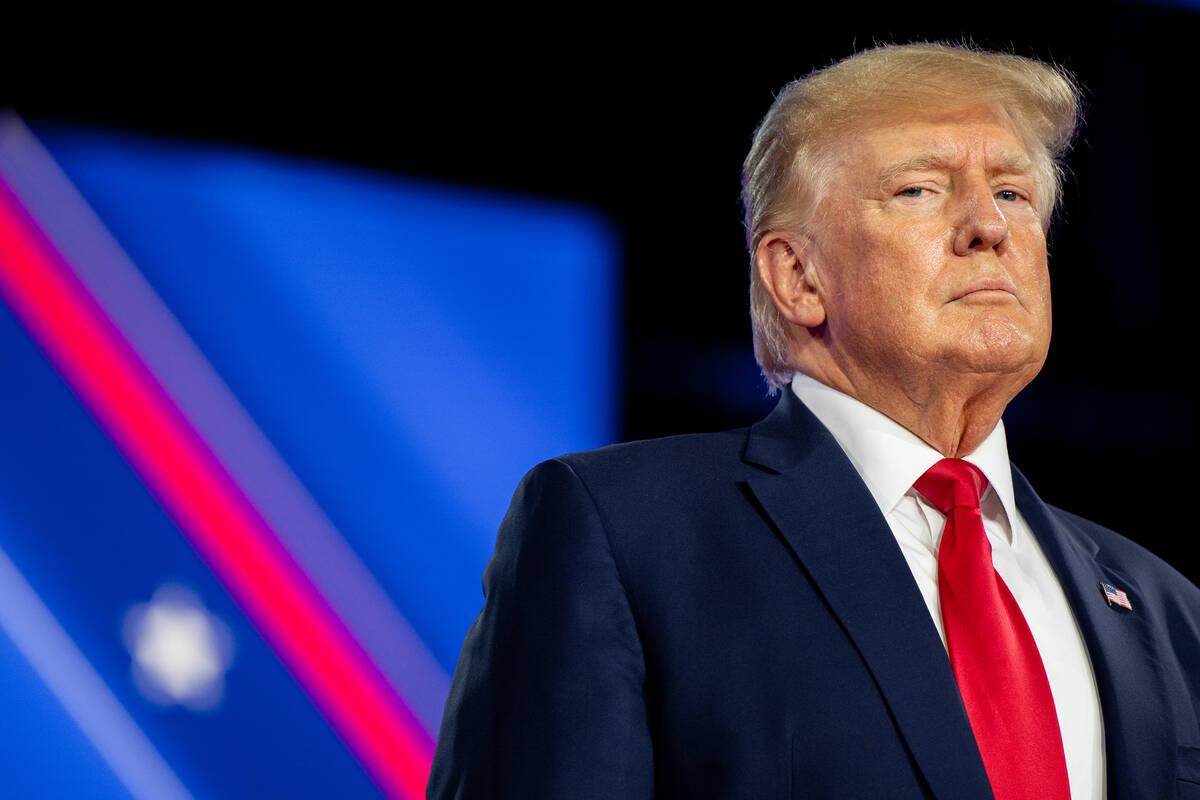Supreme Court getting heat to act on Trump ballot issues
Former President Donald Trump’s latest round of court battles opens a new legal front and tests an arcane constitutional provision preventing insurrectionists from holding political office.
Pressure is mounting on the U.S. Supreme Court to decide whether states can bar Trump, who is the Republican Party’s leading candidate, from the ballot. The case would be unprecedented and brings Trump’s conduct after losing the 2020 election back to the forefront of his likely 2024 rematch with President Joe Biden.
On Thursday, Maine’s top election official blocked Trump from the primary ballot, citing his actions related to the riot at the U.S. Capitol on Jan. 6, 2021. That ruling followed a groundbreaking decision in Colorado last week declaring him ineligible to be on the ballot primary there.
“A single state is a random decision. Two states becomes a trend,” said Republican pollster Frank Luntz. And if a third state were to join, that would be “truly impactful,” he added.
Other states, including California on Thursday, have said Trump can appear on the ballot. The conflicting decisions add urgency to calls for clarity from the Supreme Court, with the Republican nominating process starting in just over two weeks, with the Iowa caucuses on Jan. 15.
“Secretaries of State should not be in the business of determining who can and cannot run for office when the legal water is so murky,” Rhode Island Secretary of State Gregg Amore wrote Friday in the Boston Globe, highlighting the pressures facing election officials.
Amore said he believed “voters have ample reasons to disqualify” the former president but that he would keep him on the ballot if he is found eligible.
“If former President Trump qualifies for the ballot under RI law and the Supreme Court of the United States does not order our office to remove him from the ballot, his name will appear. Then, the voters will decide,” Amore wrote.
Trump has faced lawsuits from voters across the country who say he cannot seek another term because of Section 3 of the 14th Amendment, which says a person who “engaged in insurrection” after taking an oath to support the Constitution is ineligible for office.
Not hurting his large lead
The questions about Trump’s eligibility for the White House have failed to dent his commanding lead over the rest of the Republican field. The RealClearPolitics average of polls shows Trump with an over 51 percentage point lead over his nearest rival, Florida Governor Ron DeSantis, nationally. Trump is well ahead in both Iowa and New Hampshire.
Trump’s legal challenges — including 91 felony accounts across multiple cases — have only bolstered his appeal among GOP primary voters. That’s likely to continue as states try to remove him from the ballot, said University of Iowa political science professor Timothy Hagle.
“You get your people energized and they’re going to show up,” he said. “There are also some people who are still persuadable, who may think, ‘maybe I will vote Trump after all.’ ”
Trump’s Republican rivals have already struggled to present themselves as viable alternatives to the former president while trying to avoid directly attacking him and stoking the anger of his sizable base.
The Trump campaign has lambasted efforts to bar him as politically motivated and he has insisted he acted within his official duties in the run-up to the assault on the Capitol, where his supporters sought to stop lawmakers from certifying Biden’s victory.
“We are witnessing, in real-time, the attempted theft of an election and the disenfranchisement of the American voter,” Trump’s campaign said in a statement after Maine’s ruling.
Lisa Camooso Miller, a Republican strategist, said the cases across the country will “add fuel to the fire” for election deniers.
Constitutional crisis
“This is a constitutional crisis that we’re living in,” Camooso Miller said. “This is a former president that absolutely incited an insurrection on the U.S. Capitol and tried to stop the electoral process from happening.”
The Supreme Court is likely to decide soon whether it will review the Colorado Supreme Court decision that declared Trump ineligible for the ballot there. State Republicans have asked the justices to intervene, and Trump is expected to file his own appeal in the coming days.
Colorado voters seeking to bar Trump have asked the justices to expedite briefing, which means the high court could use a Jan. 5, 2024, private conference to consider granting review.
The stage is set for an “epic constitutional showdown,” said Michael Waldman, president of the Brennan Center for Justice at New York University School of Law. “This puts more pressure on the Supreme Court to act and make a decision. There’s a real need for national clarity on this.”
Ruling may not fix it
Even with the high court’s intervention it is unclear how clearly a ruling could resolve the matter.
“It’s a legal and political thicket that the Supreme Court is going to be dragged into here,” Colorado Republican Party Chairman Dave Williams said. “We can’t have them kicking it back to the courts and re-adjudicating this. Hopefully cooler heads would prevail. We can’t have an outcome that allows other states to remove the leading Republican contender from the ballot.”
Waldman said he expects the justices to decide not whether Trump engaged in insurrection, but who has the authority to decide whether such an act bars him from holding office in the future, potentially throwing those decisions back in the hands of state courts and election officials.
Ty Cobb, a former White House lawyer under Trump, said a Supreme Court ruling favoring the ex-president in the Colorado case could effectively end the lawsuits elsewhere by rendering them moot.
The legal morass puts Trump’s future in the hands of the justices, three of whom he nominated to the court, dragging the institution into another high-profile political fight at a time when polls show public confidence in the institution near historic lows.
Colorado’s secretary of state on Thursday said Trump would be included as a candidate on the ballot on Jan. 5, unless the Supreme Court declines to take the case or otherwise affirms the state high court’s ruling.
Trump has so far been successful in fending off some challenges, including in crucial swing-state Michigan where the state’s top court said he could remain on the ballot.





























